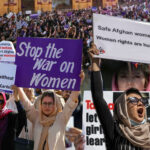
g7 foreign ministers’ communique & demands in japan
Following a three-day meeting in Japan that ended on Tuesday, the foreign ministers of the Group of Seven industrialized countries released the following statement.
As the world navigates serious threats to the international system, including Russia’s ongoing war of aggression against Ukraine, the G7 foreign ministers of Canada, France, Germany, Italy, Japan, the United Kingdom (UK), and the United States of America (U.S.), as well as the High Representative of the European Union, emphasize our strong sense of unity. They all brought up a number of human rights issues, Tabliban’s situation, and the treatment of women there.
Short List of G7 Foreign Ministers’ Communique & Demands in Japan
The “immediate reversal” of an Afghan ban on women working for NGOs and the UN was demanded by G7 foreign ministers on Tuesday.
Keep Reading
Top diplomats reportedly stated, “We call for the immediate reversal of unacceptable decisions restricting human rights and fundamental freedoms, including the latest bans prohibiting Afghan women from working for NGOs and the UN.” AFP reports.
Additionally, the group denounced the Taliban government’s “systematic abuses of human rights of women and girls and discrimination against members of religious and ethnic minorities,” according to AFP.
After expanding a ban on Afghan women working for non-governmental organizations, including the UN, that had been in place since December, Taliban authorities this month sparked outrage on a global scale.
They’ve downplayed criticism of the action, saying that it’s an internal matter that needs to be “respected by all sides.”
The UN claims that because of the ban, it must make an “appalling choice” regarding whether or not to continue operations in Afghanistan.
It argues that the ban is unenforceable because it is “illegal under international law, including the UN Charter.”
According to their interpretation of Islam, Taliban authorities have prohibited Afghan women from many government jobs and higher education since taking power in 2021, according to AFP.









